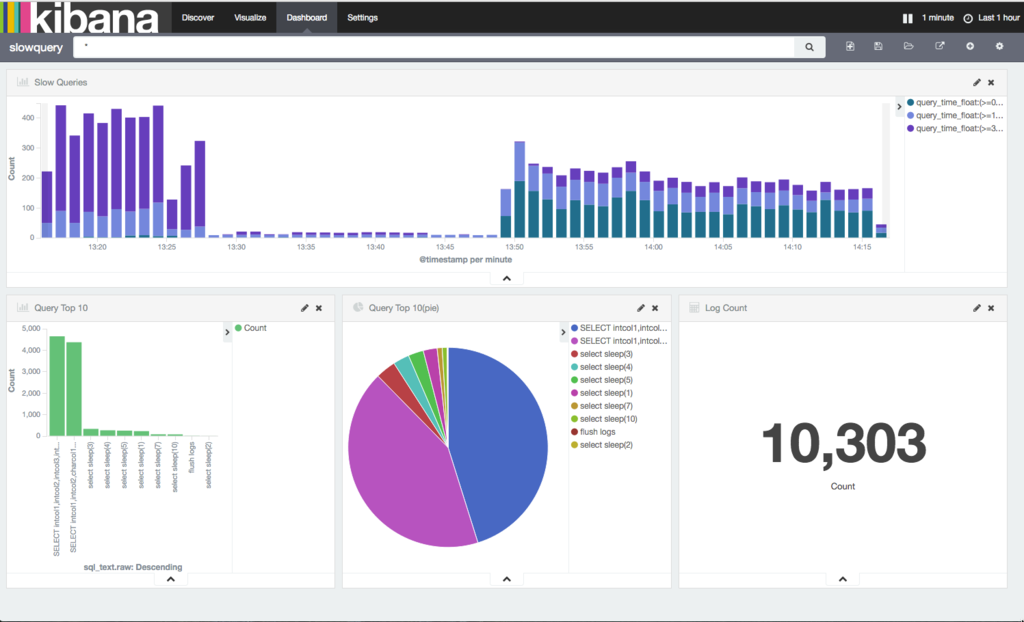- RDS の勉強をしたい→スロークエリの設定を見てみよう
- RDS のスロークエリをお手軽に可視化出来ないものか
- Elasticsearch + Fluentd + Kibana(EFK スタック) を改めて勉強したい
- 実サービスへの影響を極力抑えたい
- 可視化する手間は極力省く
ということで、docker-compose を利用することで、ほぼコマンド一発で可視化する環境は起動するはず。
- http://qiita.com/ryonext/items/e8491f8abd360fae4095
- http://kikumoto.hatenablog.com/entry/2015/12/04/000152#in_mysqlslowquery_ex
- ログの出力先をテーブルに設定する場合
- log_output : TABLE
- slow_query_log : 1
- long_query_time : 任意の秒数
- ログの出力先をファイルに設定する場合
- log_output : FILE
<source>
@type rds_slowlog
tag rds-slowlog
host ${RDS_ENDPOINT}
username ${RDS_USERNAME}
password ${RDS_PASSWORD}
</source>
(snip)
<source>
@type rds_mysqlslowlog_stream
tag rds-slowlog
db_instance_identifier your-db
marker_file /tmp/log_marker.txt
</source>
(snip)
elasticsearch:
image: elasticsearch
ports:
- 9200:9200
- 9300:9300
fluentd:
build: .
links:
- elasticsearch
volumes:
- .:/home/fluent
environment:
- FLUENTD_CONF=stream.conf
- AWS_ACCESS_KEY_ID=AKxxxxxxxxxxxxxxxxxxxxxxxx
- AWS_SECRET_ACCESS_KEY=xxxxxxxxxxxxxxxxxxxxxxxxxxxxxx
kibana:
image: kibana
ports:
- 5601:5601
links:
- elasticsearch- ログの出力先をテーブルに設定した場合
docker-compose build
docker-compose up -d- ログの出力先をファイルに設定した場合
docker-compose -f docker-compose-stream.yml build fluentd
docker-compose up -d- ログの出力先をテーブルに設定した場合
curl -XPUT http://elasticsearch:9200/_template/mysqlslowquery_template -d '
{
"template": "mysqlslowquery-*",
"mappings": {
"mysqlslowquery": {
"properties": {
"query_time_in_ns": { "type": "integer" },
"lock_time_in_ns": { "type": "integer" },
"rows_examined": { "type": "integer" },
"rows_sent": { "type": "integer" },
"sql_text": {
"type": "string",
"fields": {
"raw": {"type": "string", "index": "not_analyzed"}
}
}
}
}
}
}'- ログの出力先をファイルに設定した場合
curl -XPUT http://elasticsearch:9200/_template/mysqlslowquery_template -d '
{
"template": "mysqlslowquery-*",
"mappings": {
"mysqlslowquery": {
"properties": {
"query_time": { "type": "float" },
"lock_time": { "type": "float" },
"rows_examined": { "type": "integer" },
"rows_sent": { "type": "integer" },
"sql": {
"type": "string",
"fields": {
"raw": {"type": "string", "index": "not_analyzed"}
}
}
}
}
}
}'mapping template を設定後、念のためにインデックスを削除しておく。
curl -XDELETE "elasticsearch:9200/mysqlslowquery-*"スロークエリが検出されると Elasticsearch にログが蓄積されるので、あとは Kibana で確認する。 Kibana テンプレートも一応用意してあるのでインポートすれば OK 牧場。
% tree kibana
kibana
├── dashiboard.json
├── discover.json
└── visualize.json
0 directories, 3 files- 当初は TABLE では無く、FILE で記録したかったけど断念
sql又はsql_textは analyze させないこと(multi_fieldは利用出来ないので注意する)- ローテーションを行う際のクエリも飛んできてしまうので fluent-plugin-rewrite でローテーションクエリを除外
query_timeとlock_timeのフォーマットがNN:NN:NNとなっているので record_transformer プラグインで強引に数値化している
- スロークエリログを FILE にした場合にどのように可視化するかを検討する
- docker-compose v2 に対応させる
